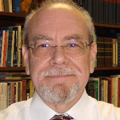
The School for Theological School Deans
Recently I spoke with a seminary dean in her fourth year in office. After four years she is stepping down, but takes some pride in having hit the top end of the average tenure for faculty in that office. While she had taken some undergraduate education courses she spoke of the challenges she faced in the area of educational administration required in the office of the dean. During our conversation she repeated what seems to be a recurrent cry, "We really need a school for theological school deans!"
That got me to thinking what a school for theological school deans might look like. What might be a crash program of study for persons moving from faculty to deanship? Most theological school deans come from among the faculty and are scholars and teachers, but often not "educators" in the strictest sense. Some may have church leadership experience, but most have not had experience leading an educational institution--which is a different type of system. Very often, the insight is about the gap between what we think we know about the job, and what the job actually entails. Many would wish for a crash course on "just how do you DO this job?!"
What knowledge can help when moving from a focus on teaching, scholarship, and academics to a focus on administration and leadership? Below is a playful program of study for such a "school." I tried to identify the cluster of courses that can offer just the right amount of knowledge for the task at hand. You can fill in the course description based on your own interest and needs.
DED100 History and Philosophy of Theological Education: Foundations
DED101 Curriculum Design and Development for Theological Schools
DED102 Assessment in Theological Schools: Curricular, Programmatic, and Institutional
DED103 Supervision in Theological Schools: Faculty and Staff Relations and Development
DED104 Educational Administration in Theological Schools: Work smarter, not harder, and stay longer
DED105 Educational Leadership in Theological Schools: It's not Church, it's not university, and it's not what it used to be.
So, what do you think? Too little? Too much? What else would you include in a program of study for a school for deans?
Israel Galindo is Dean and Professor of Christian Formation and Leadership at the Baptist Theological Seminary at Richmond. He participated in the first Wabash colloquy for theological school deans.
This is a really nice list, and I really appreciate the affirmation that this isn’t a “natural” transition for any of us (even folks who come from an ed background!). I was fortunate to participate in the ATS School for New Deans in Pittsburgh this past December, where some of this was covered in really helpful ways. I’d add something on budgeting — both the small scale (how to propose, follow, and revise an annual budget, including keeping good records) and the big pictures (how to think of your budget in relation to the larger institution, how to think of budgets over time, how to think of budgeting as art as well as politics). Records management is also helpful within the context of supervision, as part of mentoring someone toward tenure and promotion is also the giving and recording of consistent feedback, a real challenge when you might not be the dean who hired someone nor the dean when they come up for advancement. At a smallish school like mine, something on compliance and regulation would be very useful — either within assessment or supervision, I suppose — but I suddenly oversee Title iX, VA benefits, DOE compliance, FMLA, and so on, with absolutely no training as a lawyer! Actually, full training as a lawyer, MBA, architect, marketing specialist, caterer, and more could be quite helpful :). I would hope DED104 would include how to be a wise institutional sage, motivating faculty (and other) colleagues without manipulation. And definitely a strong emphasis on self-care and whole-person stuff (including how to still do the things you love even if you can no longer make time to write books or travel as before). As part of that, you might rethink the DED designation, which is awfully close to DEAD!!!
Thanks, as always, Israel!
Debbie
Debbie, thanks for this insight. You’ve certainly “fleshed out” the content and scope of this fantasy curriculum. I missed the ATS school for deans, but have heard good things. Glad for it.
Yes, the whacky loopy world of endless and ever-changing legal and compliance matters of higher education opens up a whole universe for deans.
Thanks for your insight! There’s evidence there that you indeed understand the job!
–Israel